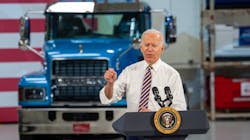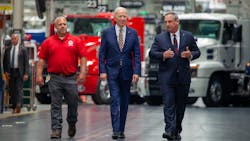Biden emphasizes 'Buy American' during Mack Trucks Lehigh Valley visit
“I’m not going to say anything, I just came to drive a truck,” President Joe Biden quipped as he walked onto the podium at Mack Trucks’ Lehigh Valley Assembly Operations (LVO) facility in Pennsylvania on July 28. All Mack heavy-duty models for North America and export are assembled at the LVO facility.
Biden visited the 121-year-old plant and remarked on the importance of American manufacturing and buying products made in America. But before going into the nitty-gritty of his administration’s Buy American agenda, Biden kicked things off with a bit of a Mack Trucks history lesson.
“John Mack started this iconic American company in 1890, but things really didn’t get off the ground until four years later when he brought his brother William down from Scranton,” said Biden, who was born in Scranton. “So, it goes to show you, if you want to get things moving, bring a guy from Scranton to get it going.
Mack recently completed an $84 million investment in plant improvements at LVO, which included the insourcing of chassis assembly, the addition of new equipment, and a 300,000 square-foot expansion of the facility. The plant upgrades were completed in 2020. LVO currently employs more than 2,500 people and plans to hire up to 400 more this year, the company stated.
“We are honored that President Biden chose to visit Mack Trucks today,” said Martin Weissburg, president of Mack Trucks. “This week marks the 121st anniversary of Mack Trucks, and we are very pleased to celebrate this milestone with the president. Mack is part of the only heavy-duty truck manufacturing group to assemble all of its trucks exclusively in the U.S. for this market.”
During his visit to Mack’s one-million-square-foot plant, which has three cab and two chassis assembly lines, a truck modification center, and engine groom line, Biden met with employees, including those represented by United Auto Workers Local 677, and toured LVO, learning about Mack’s assembly process, its supply chain, and Mack’s commitment to producing battery-electric vehicles. Biden was able to see firsthand the Mack LR Electric battery-electric refuse vehicle, Mack’s first fully electric Class 8 truck.Biden also emphasized his commitment to support and grow more American-based companies, strengthen American manufacturing, secure critical supply chains, and confront the climate crisis.
“I can sum it up in two words: Buy American,” Biden said. “Most people don’t know that for almost a century there has been a law in the books in America called the Buy American Act. It’s supposed to make sure that your government spends your tax dollars in buying goods that they have to be goods that were built and purchased in America.
“In recent years Buy American has become a hollow promise, and my administration is going to make Buy American a reality,” Biden added.
Today, Biden said his administration is going to make the biggest enforcement changes to the Buy American Act in 70 years.
“Right now, if you manufacture a vehicle that gets purchased by the federal government, the law says that substantially all of the vehicle should be made in America. Because of loopholes over time, ‘substantially all’ means 55% of it was made in America and all the rest of it can be purchased from other places. To me, 55% is not substantially all,” Biden said. “This is actually a double whammy—first, 55% is not high enough, and second, contractors have to tell us the total domestic content of their product, they just have to tell us that they hit the threshold with nobody checking. They’ve got a new sheriff in town; we’re going to check them.”
Biden announced that he is directing the budget office to issue a rule to raise the amount of content required to be considered made in America from 55% to 75%.
“We want to be the ones making the innovative parts of every product,” Biden said. “The ones that will support more jobs and more small business.”
During a plant tour, a Mack guide told Biden that there aren’t enough semiconductor, or computer chips, needed for engine production.
“We don’t make them anymore in America,” Biden said of the chip shortage. “I got together with a group of 20 Republicans and Democrats and we passed a new piece of legislation providing that South Korea and Taiwan open up plants here in the U.S., hiring American employees to make those computer chips so we’re not held hostage. Not only you, but Ford Motor Company said they are going to have to stop producing vehicles because they can’t get the chips.”
Biden emphasized the importance of creating new rules for critical products and stronger, more resilient domestic supply chains.
“We’re talking about components like semiconductors, pharmaceutical ingredients, advanced batteries, among other things,” he said. “We saw during the early days of the pandemic that the supply chain disruptions could put American lives and livelihoods at risk. When we needed it the most, we were short on protective equipment, we were short on ventilators, and other essential health equipment—we couldn’t get the job done, we couldn’t take care of people.
“I know a lot of you in this factory stepped up to make PPE at the time. That was a noble service but it’s not a long-term solution,” Biden added. “Yes, we will keep trading with our allies, but we need to have a resilient supply chain of our own so that we are never again at the mercy of countries for critical goods ever again.”
Since the start of the pandemic, production slowed down and worker hours were cut because of various material and semiconductor shortages. Truck builds are backlogged, and order boards are full, with fleets waiting extended periods of time for new trucks and equipment to keep their operations moving.
The CHIPS Act, which is part of Biden’s Build Back Better Plan, includes bipartisan support to address some of these domestic problems and shortages. Build Back Better also includes incentives for vehicle electrification and to increase the amount of clean energy the government buys.
“I just saw the work you’re doing in the heavy-duty electric vehicle space, like electric garbage trucks,” Biden told Mack’s Lehigh Valley workers. “There are more than 600,000 vehicles in the federal fleet—the largest portion of which are at the Post Office. As we work to electrify them, we are going to be making a market for electric vehicles—supporting both good jobs created and the innovation that we need to electrify our transportation sector and cleaning up our environment at the same time. We will be expanding my Made in America initiative to help cities, towns, and tribes get a better deal when they buy a Made in America product.
“Looking at how fast the world is changing,” Biden noted, “who would have thought 20 years ago that you would be making electric garbage trucks here?”
About the Author

Cristina Commendatore
Cristina Commendatore is a past FleetOwner editor-in-chief. She wrote for the publication from 2015 to 2023.

